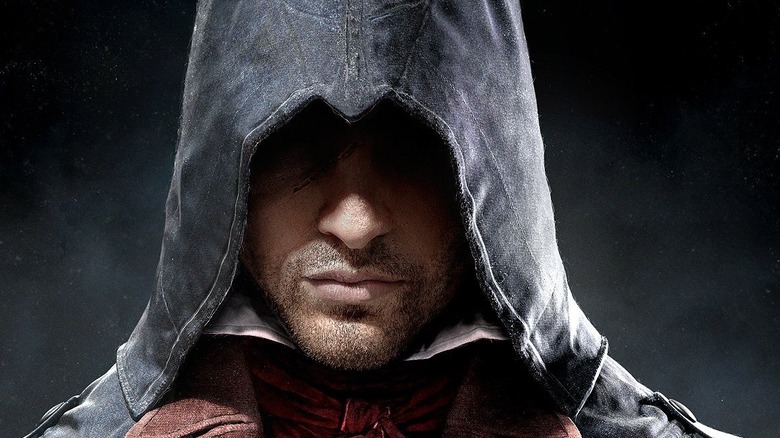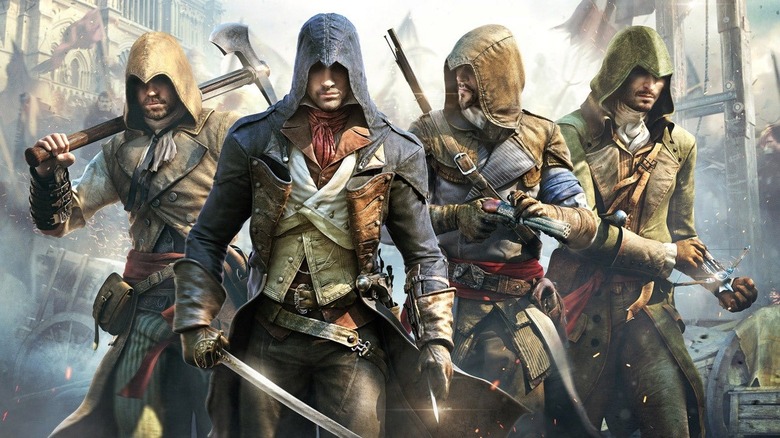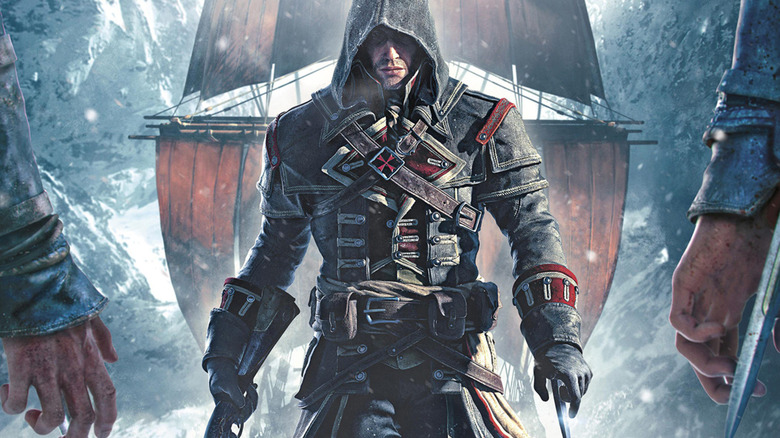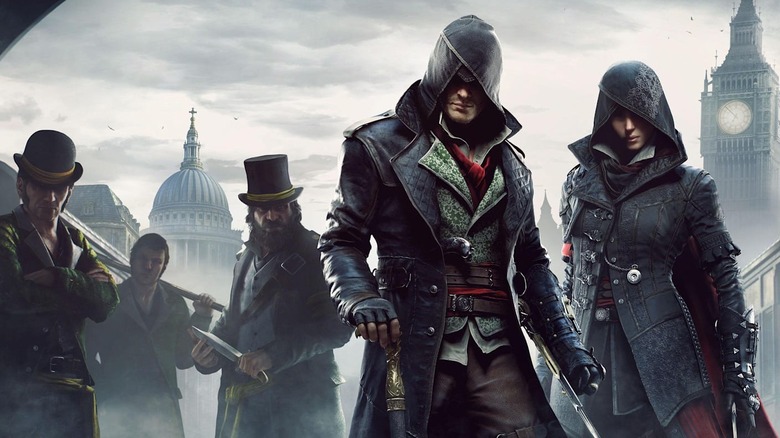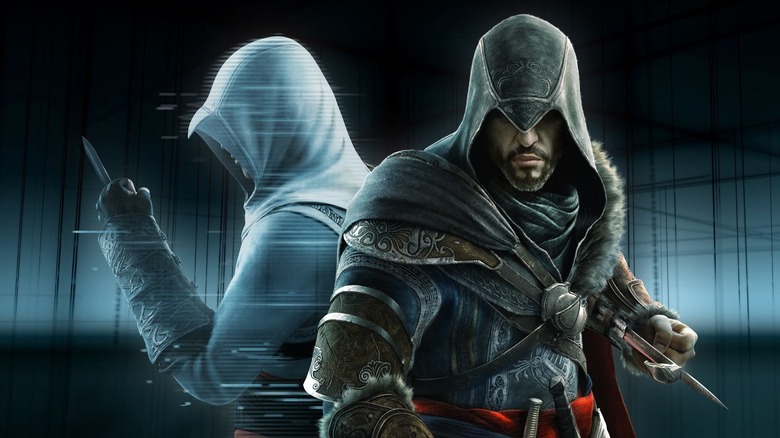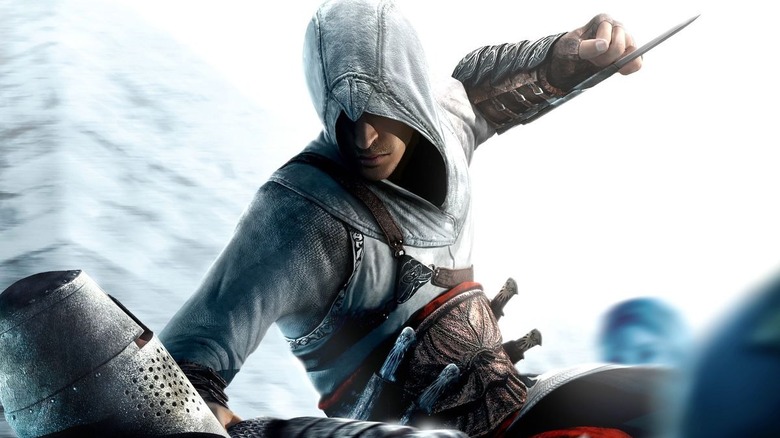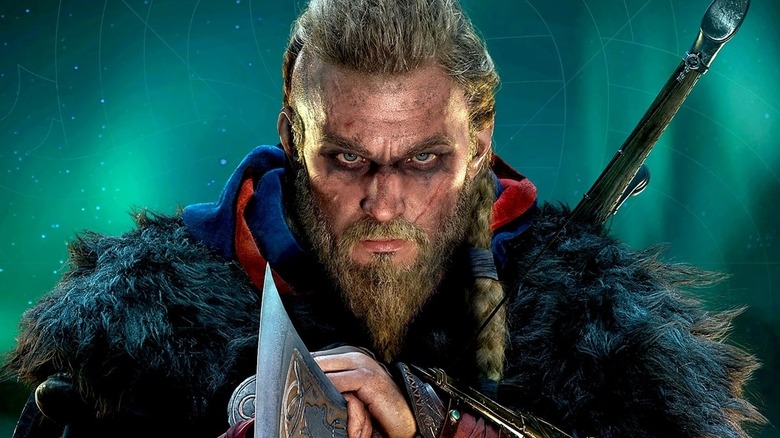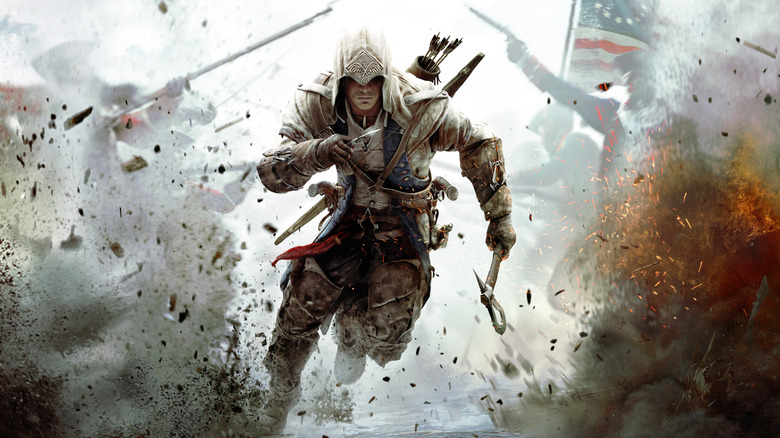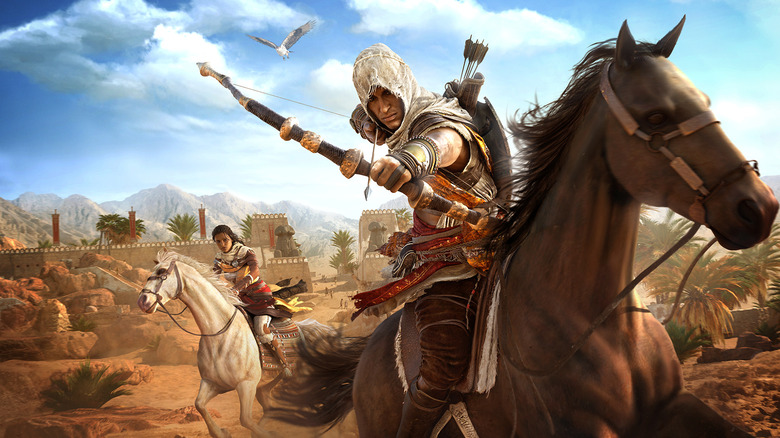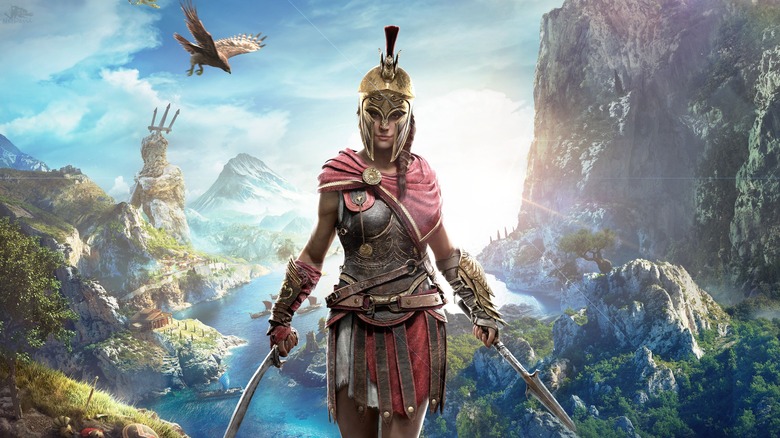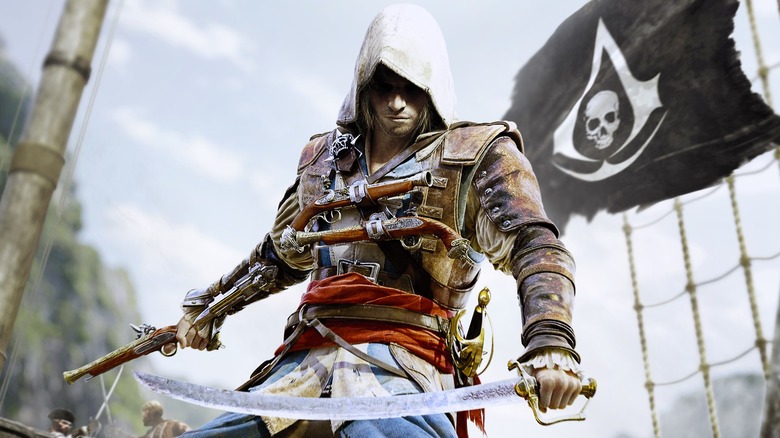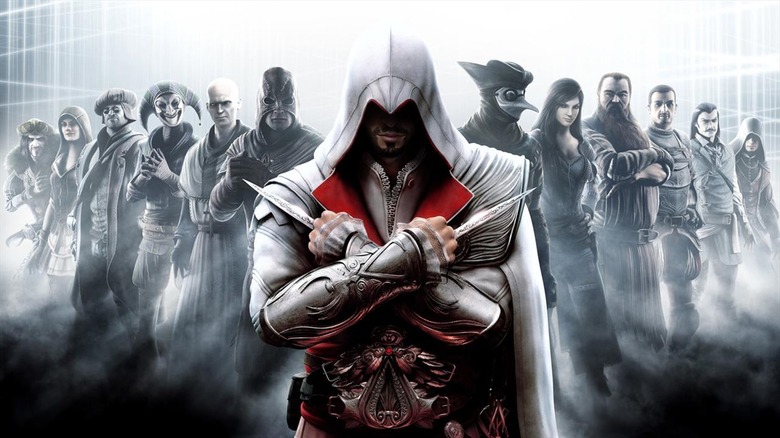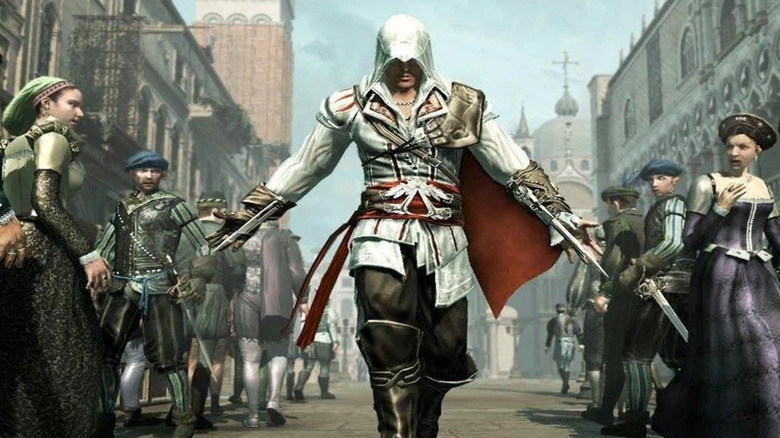Every Mainline Assassin's Creed Game Ranked By Metacritic Scores
There are few game franchises that can match the cultural impact of "Assassin's Creed," which has eclipsed the games that inspired it. Ever since the first game debuted in 2007, Ubisoft has been whisking players off on incredible adventures that blend engaging game mechanics with fantastical versions of history. What's more is that the series has also introduced some of gaming's most recognizable heroes in Altaïr Ibn-La'Ahad, Ezio Auditore da Firenze, Edward Kenway, and Kassandra the misthios — just to name a few. Seeing these heroes play important roles throughout time and interact with real-life historical figures like Benjamin Franklin and the fearsome Blackbeard has made each entry a joy to witness.
"Assassin's Creed" chronicles the centuries-spanning conflict between the Assassins Brotherhood and the Knights Templar. It is such a monumental collection of games that it has seeped into other corners of pop culture as well. Novels, comics, a film adaptation, and an upcoming Netflix show have bolstered the franchise's staying power over the years. The series has additionally received a plethora of DLC expansions and spin-offs, and all of these extra inclusions have satisfied eager fans who were hungry for more stories.
"Assassin's Creed" is not going away anytime soon. Despite a couple of mediocre releases, it remains one of gaming's most popular franchises. Here is every mainline game of the series ranked by Metacritic scores, with each entry represented by its most well-received version.
12. Assassin's Creed Unity
2014's "Assassin's Creed Unity" is the definitive low point of the series so far, and was a frequent punching bag online for many of its issues. However, it still received a 72 for its Xbox One version, which isn't that low of a score in the grand scheme of game releases.
That's not to say that its criticism wasn't justified. Although it was only found in PC versions of the game, the game's "no face" bug was a common source for poking fun upon release. Of course, there were still a ton of bugs found in other versions, along with frequent framerate drops, but performance wasn't the only issue plaguing the game.
"Unity" was mostly set during the French Revolution in Paris and followed Arno Dorian, a nobleman's son who joins the Assassin Brotherhood to learn about the events surrounding his father's assassination. While its story and setting were received positively, as it the case with most games in the series, its signature gameplay had begun to grow stale. After "Unity," "Rogue," and "Syndicate," all of which launched within a year's time, Ubisoft would take some time off to re-evaluate the series, a decision many critics agreed with.
11. Assassin's Creed Rogue
Strangely, while "Unity" launched on the then-new PlayStation 4 and Xbox One, "Rogue" released on the previous generation of consoles on the very same day: November 11th, 2014. And while its console versions earned the same score as "Unity," "Rogue" was slightly better-received on PC, earning a 74 when it released a few months later.
"Rogue" follows Shay Cormac, once a member of the Assassin Brotherhood who turns against them after he loses faith in their purpose and methods. Playing as a member of the Knights Templar (who are traditionally the villains of the franchise) was seen as a clever twist on the formula, as was setting it within the Seven Years War, a crucial global conflict in the 18th century.
However, those elements didn't save it from some of the common criticisms of the franchise, namely that its gameplay didn't bring anything new to the table. It was incredibly similar to "Black Flag," a favorite of the franchise, which some critics praised and others criticized.
10. Assassin's Creed Syndicate
The final piece in the unofficial trilogy of games that forced Ubisoft to rethink the series is 2015's "Assassin's Creed Syndicate." Although it was the most positively-received of the three, earning a 78 on the Xbox One, it was clear that some things needed to change. Still, each game in the series brings fun elements and "Syndicate" had its fair share.
Set during the Victorian Era in London at the height of the Industrial Revolution, the game followed sibling assassins Jacob and Evie Frye. With the Templars essentially in control of the entire city, players controlled both characters as they attempted to use organized crime to free the working class. Both Jacob and Evie had different ways of combating the Templars. While Jacob formed a gang called the Rooks for more action-heavy gameplay, Evie took the stealthy approach and could even turn invisible with a late-game skill.
Being set during the Industrial Revolution, "Syndicate" also brought a new type of traversal to its world in the form of carriages. Some critics felt that the game's use of historical figures, such as Charles Dickens and Karl Marx, enhanced its story.
9. Assassin's Creed: Revelations
2011's "Assassin's Creed: Revelations" is the fourth game in the series and is notable for completing the stories of both Altaïr Ibn-La'Ahad and Ezio Auditore da Firenze, two of the franchise's most well-known protagonists. While the present day plot picked back up on Desmond Miles as he explored the memories of his ancestor Ezio, Ezio followed the footsteps of original series protagonist Altaïr.
Most of the game was set in 16th Century Constantinople as Ezio searched for Altaïr's secret library, said to house all of the renowned assassin's knowledge and a secret weapon. This naturally gained the attention of the Knights Templar, who were also searching for the five keys needed to enter the library, sending players into a race against time.
Revelations earned an 80 on the Xbox 360, PlayStation 3, and PC. While critics and fans felt it did a great job of wrapping up Ezio's storyline, the stealth-action gameplay was essentially the same as the games that came before it. However, the introduction of the hookblade made for better traversal — especially when it came to assassinating foes from ziplines — and it was a welcome addition.
8. Assassin's Creed
The one that started it all. Assassin's Creed released in 2007 and while it is far from the series' most beloved entry, there's no denying that it changed the face of gaming. Before the series went open-world and had ties to people and events throughout history, the first game focused on tasking players with stealthily using their hidden blade against enemies and climbing towers to unlock sections of the sandbox map.
Assassin's Creed would begin a plot that would span multiple games, following a present day bartender named Desmond Miles whose ancestor was one of the most important figures of the 12th Century. With a state of the art device called the Animus, Abstergo Industries used Desmond to relive the memories of Altaïr Ibn-La'Ahad. Set in the Holy Land during the Third Crusade, it introduced players to the war between the Templars and the Brotherhood.
The most well-reviewed version of the game was found on the PlayStation 3, which earned an 81 from critics.
7. Assassin's Creed Valhalla
The most recent game in the series, 2020's "Assassin's Creed Valhalla," has received its fair share of criticism. And a lot of that criticism seems to stem from the game being exactly what the audience has come to expect: gameplay that has grown a bit too familiar and, one of the common pitfalls of open-world design, a playtime that drags on for a bit too long. Still, there were plenty of new frills for players to enjoy, starting with its setting.
Since 2017's "Origins," the "Assassin's Creed" series has been focusing more on ancient settings with popular mythologies. "Valhalla" went the Norse route, focusing on a Viking raider named Eivor who was instrumental in leading their people in the Vikings' invasions of Britain during the 800s. Like "Odyssey" before it, "Valhalla" was mostly grounded in reality with a few key moments of myth blended in, such as a fight against Odin himself.
The game's best-reviewed version was on the PlayStation 5, where it earned an 84. But fan hype was clearly through the roof, as "Valhalla" had the best launch of the entire series.
6. Assassin's Creed 3
With the previous three entries focusing strictly on Ezio's story, Ubisoft needed a fresh take on the series for its fifth entry. Luckily for fans, 2012's "Assassin's Creed 3" didn't disappoint. It was set around the American Revolution and followed the Assassin Ratonhnhaké:ton, also known as Connor, a half-English half-Mohawk ancestor of Desmond Miles who fought against the Templar's grasp for power within the colonies.
The new setting and protagonist were both well-received, with Ratonhnhaké:ton's story being particularly engaging thanks to his father being a member of the Templars. In fact, he was none other than Haytham Kenway, who also appeared in "Assassin's Creed Rogue."
In addition to a great plot that concluded Desmond's present-day storyline, Ubisoft made subtle improvements to the core gameplay. Vast sections of wilderness allowed for more varied parkour movies using trees and cliffs. Meanwhile, updated combat elements included new weapons for Ratonhnhaké:ton to use, like tomahawks, muskets, and a bow and arrow. These small changes in gameplay and a unique setting earned the game its highest ratings: an 85 on the PlayStation 3 and the Wii U.
5. Assassin's Creed Origins
With the lowest rated games in the series well behind them, the team at Ubisoft took 2016 off to give "Assassin's Creed" a much-needed break — and a makeover. From the developers' work came 2017's "Assassin's Creed Origins," a game that went back to the earliest point in the series' timeline and sought to unveil the beginning of the Assassin Brotherhood.
The game followed Bayek, a Medjay (or protector) devoted to defending the Ptolemic Kingdom of Ancient Egypt. Not only did the game dive into political struggles involving Cleopatra and Julius Caesar causing distress in the Kingdom, but there was also a secretive organization vying for control over Egypt. This organization, known as the Order of the Ancients, is a precursor to the Knights Templar and were responsible for the death of Bayek's son. Seeking revenge, Bayek and his wife Aya become the very first Assassins.
Bayek's story and some much-needed tweaks to gameplay helped to revitalize the series in a big way. And its highest rated version earned an 85 on the Xbox One.
4. Assassin's Creed Odyssey
Following the celebrated success of "Origins," Ubisoft looked to Ancient Greece for the next installment. 2018's "Assassin's Creed Odyssey," while not the first to include a female protagonist, was the first to let players choose between a male or female hero. Even with that choice implemented, both versions of the character were cleverly implemented into the storyline.
It followed a mercenary, either Kassandra or Alexios, during the Peloponnesian War. Players could choose to aid Athens or Sparta in the conflict, though playing both sides could fill your pockets. The central story took the mercenary on a quest of vengeance against the Cult of Kosmos, an evil organization fueling the war who were responsible for nearly killing the protagonist and brain-washing their sibling into murdering for them.
Combat and skill trees were enhanced from "Origins," as were new gameplay elements, such as massive military battles and being hunted by other mercenaries if the player gains too much notoriety. "Odyssey" scored slightly better than "Origins," with the Xbox One version earning an 87.
3. Assassin's Creed IV: Black Flag
"Assassin's Creed 3" was a refreshing new direction for the series, but its sequel is a titan among the other entries. "Assassin's Creed 4: Black Flag" released in 2013 to incredibly positive reviews, with its highest-rated version appearing on the PlayStation 3 with an 88. As fans probably know by now, everything from its rollicking story to its fantastic gameplay has earned the game its high placement.
"Black Flag" followed Edward Kenway — grandfather to "Assassin's Creed 3" protagonist Ratonhnhaké:ton — and was set in the Caribbean during the 18th Century at the height of piracy. As its setting would imply, Edward doesn't begin with the noblest of intentions. He even teams up with famous pirates of the time, including Blackbeard and Mary Read. Everything changes when he stumbles into the conflict between the Brotherhood and the Templars, who are searching for a place called the Observatory in order to blackmail world leaders.
As befits its pirate theme, the world of "Black Flag" was more open than any that came before it. The addition of sea exploration and combat via Kenway's ship, the Jackdaw, as well as the ability to use a spyglass to scope out islands and enemy ships made life as a pirate exceptionally enticing.
2. Assassin's Creed: Brotherhood
Following Ezio's phenomenal debut in "Assassin's Creed 2," Ubisoft chose to continue his story in 2010's "Assassin's Creed: Brotherhood." Unlike most other entries in the series, "Brotherhood" picked up immediately after its predecessor, with the game's story following Ezio in 16th Century Rome.
Ezio is arguably the most important figure in the franchise's history, mainly due to his closeness to major events in the series' timeline. "Brotherhood" follows his efforts to undermine and sabotage the Borgias, one of history's most notorious crime families, as well as to rebuild the Assassin Brotherhood in Italy over the course of several years.
Ezio's rebuilding of the Brotherhood tied in with a new gameplay mechanic that allowed players to recruit citizens to help in later missions. In addition to the stealth-action gameplay the games had become known for, "Brotherhood" also introduced multiplayer to the series with 8 distinct modes. The game's highest rated version was seen on the PlayStation 3 and earned a 90.
1. Assassin's Creed 2
2007's "Assassin's Creed" may have kicked off one of gaming's biggest franchises, but without the immense success of the 2009 sequel, which earned a 91 on PlayStation 3, the series might never have become a legend. The present day plotline followed Desmond Miles looking for a way to stop the Templars by using memories of a different ancestor than the first game. Enter: Ezio Auditore da Firenze.
Set during the Renaissance Period in 15th Century Italy, this game followed Ezio after his father and brothers were framed for treason and executed. Upon fleeing his home, the once wealthy and carefree Ezio dedicated his life to training as an assassin with his Uncle Mario, who reveals the family's ties to the Brotherhood. While revenge is a common theme in many Assassin's Creed games, Ezio's story is still captivating and his dedication to protecting the world from the Templars is admirable.
Assassin's Creed II benefited from the fact that it was set in a more well-known era than its predecessor. Critics and fans also find this sequel to have a more engaging story, and praise has been heaped on the game's open world design (courtesy of the then-new Anvil engine), which Ubisoft has been using and improving ever since.

